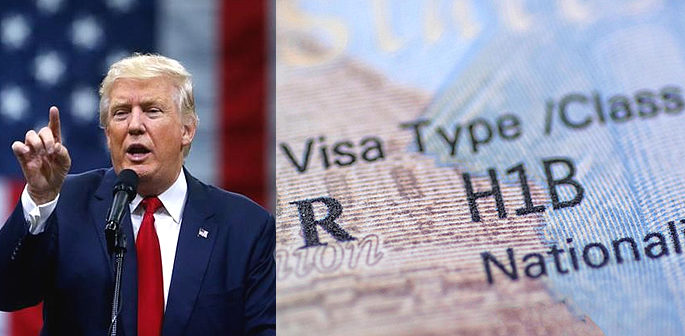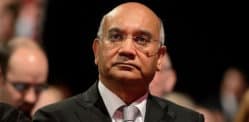“H-1Bs may slightly depress wages for high-skill workers."
President Donald Trump has temporarily suspended various visa categories. This includes H-1B visas, which allow highly skilled professionals to live and work in the US for up to six years.
The announcement was made on June 22, 2020. It comes into force on June 24 and will be in place until the end of 2020.
H-1B visas allow US companies to employ graduate-level workers in speciality occupations that require theoretical or technical expertise in specialised fields such as in IT, finance, accounting, architecture, engineering, mathematics, science, medicine, etc.
The decision will impact Indians as they are one of the largest beneficiaries of the programme. Over two-thirds of H-1B applications in 2020 came from Indians.
India’s IT industry body Nasscom said in a statement:
“Even though our companies have hired tens of thousands of Americans and invested billions of dollars in recent years, they, like others in the sector, utilise such high skilled individuals to services their clients.
“This new proclamation will impose (a) new challenge and possibly force more work to be performed offshore since the local talent is not available.”
While Indians struggle to salvage the situation, experts believe the Trump administration’s hopes from this move are largely misplaced.
Many CEOs of top American firms have given their say on the decision.
One senior government official reportedly said the move would free up over half a million jobs for Americans. However, more than 80% of experts from prestigious universities doubt the claim.
David Autor, a Ford Professor of Economics at MIT, said:
“H-1Bs may slightly depress wages for high-skill workers. But they don’t lower total jobs and they likely raise total profits and wages.”
While H-1Bs substitute and complement US workers, “the substitute US workers are already nearly fully employed,” Judith Chevalier, William S. Beinecke Professor of Finance and Economics, pointed out.
Immigration has contributed immensely to America’s economic success, making it a global leader in tech, and also Google the company it is today. Disappointed by today’s proclamation – we’ll continue to stand with immigrants and work to expand opportunity for all.
— Sundar Pichai (@sundarpichai) June 22, 2020
Nasscom said: “Policies such as these undercut the ability to grow and create jobs, inhibit the provision of critical infrastructure services, and add burdensome new regulatory requirements and costs.
“American workers are facing greater challenges than they have in years, but that does not mean that talent shortages do not continue to exist.”
Research has shown that foreign-born workers innovate and create jobs within the US.
Foreign-born STEM professionals in the US increased from about 16% to 24% between 2000 and 2015, creating an estimated benefit of $103 billion for American workers.
While medical personnel working on Covid-19 research are exempt from the temporary pause on visa allocations, that is still a narrow provision.
Over 2,800 Indian IT firms form the centrepiece of several US sectors, providing essential services to thousands of businesses across the US.
Like Apple, this nation of immigrants has always found strength in our diversity, and hope in the enduring promise of the American Dream. There is no new prosperity without both. Deeply disappointed by this proclamation.
— Tim Cook (@tim_cook) June 23, 2020
In the midst of the pandemic, these industries could be hampered.
In a letter on May 21, Compete America, which is a coalition dedicated to ensuring that the US has a highly educated and innovative workforce, said:
“Constraints on our human capital are likely to result in unintended consequences and may cause substantial economic uncertainty if we have to recalibrate our personnel based on country of birth.”
Compete America has had over 320 signatories including Adobe, Lyft, Nasdaq, Twitter, and Facebook. Other groups like the American Immigration Council have echoed similar views.
Experts have said that the move is shortsighted.
Trump’s comments since 2016 have already put off highly skilled migrants, who have looked at friendlier alternatives such as Canada and the UK.
Now is not the time to cut our nation off from the world’s talent or create uncertainty and anxiety. Immigrants play a vital role at our company and support our country’s critical infrastructure. They are contributing to this country at a time when we need them most.
— Brad Smith (@BradSmi) June 23, 2020
The suspension of H-1B visas may now have a long-term impact.
Denis Wirtz, vice-president of research at John Hopkins University warned that such decisions could create a “chilling effect,” putting scientists and engineers off from ever coming to the US.
However, it looks like the Trump administration is not changing their mind.
Rebecca Bernhard, partner at law firm Dorsey & Whitney, said:
“President Trump has made it clear that he sees restricting immigration as a key campaign issue, so it is likely that as the election draws closer we will see further action on these issues.”






























































